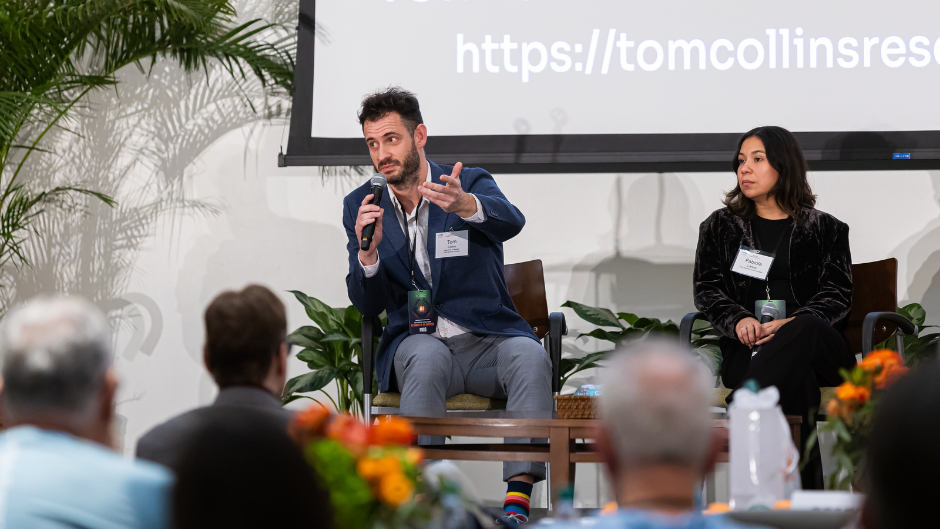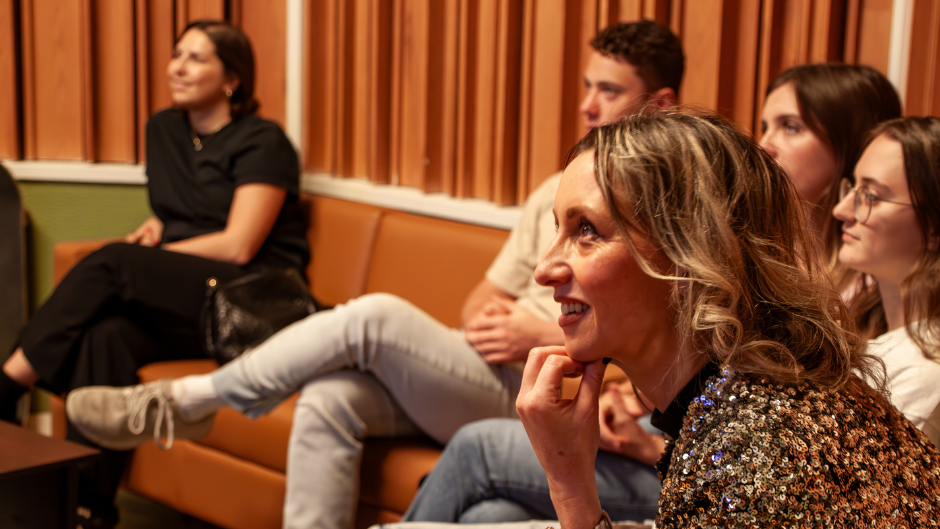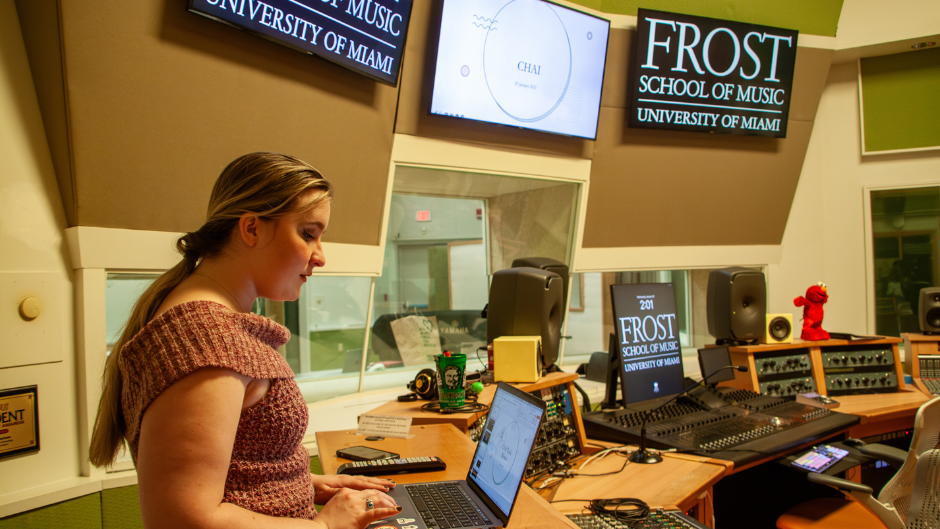A casual concertgoer at the upcoming CHAI Showcase in the Clarke Recital Hall at the University of Miami could easily think this is a traditional music performance. There will be an onstage ensemble combining Frost School of Music students and faculty with outside alumni artists playing their instruments, accompanied by eye-catching videos and props.
But the key detail is the collaborators you won’t see. The members of CHAI composed all the material in collaboration with artificial intelligence, or AI. Hence the name CHAI, which stands for “Concerts With Humans and Artificial Intelligence.”
“Apart from a few exceptions like AI song contests, this will be the first organic pop concert where everything was co-created with AI,” said Tom Collins, the associate professor in the music engineering department at the Frost School of Music who has been spearheading many of the Frost School’s AI efforts. “Some of it might sound ordinary, genres you’re familiar with. But some aspects at the moment may sound very different. The interesting thing is that it comes from a group of students using AI to push in new creative directions, using AI as a springboard by leveraging cutting-edge technologies such as timbre transfer and source separation.”
That’s also the agenda of Raina Murnak, assistant professor in the Modern Artist Development and Entrepreneurship (M.A.D.E.) program, who is providing most of the artistic vision behind the CHAI concert. An accomplished vocalist, she will also perform a song on the program.
Funded by a $100,000 grant from the University’s Lab for Integrative Knowledge (U-LINK), CHAI is one of the most visible outgrowths of the Frost School’s work in the rapidly growing field of artificial intelligence. Working with their colleague Christopher Bennett, an associate professor in music engineering technology, Murnak and Collins have been exploring ways to make AI-generated music sound more, well, musical – and also how to make AI less intimidating to artists who are leery of it.

“This show isn’t just musical but also visual, with objects onstage and some AI-generated video,” said Murnak of the April 12 concert. “The whole show is live music, not just pressing ‘play,’ a live band with some pre-recorded AI elements put together unusually. I think that CHAI needs to look, feel, and be cutting-edge.”
“It will also have an element of humor, because there are so many fear-based feelings surrounding AI these days,” she added. “So we’re leaning into that.”
Indeed, CHAI is happening over a backdrop of widespread uncertainty about AI, a transformative technology that is quickly making itself felt in wide swaths of society, culture, and even government. There is a great deal of concern in the music industry that the technology could mean that human musicians are going to be replaced by machines.
“The pace of change is surprising even to me, and I’ve got my finger on the pulse,” said Collins. “It’s exciting for sure, but also unnerving. There are competing narratives – concerns about AI taking jobs and musicians’ careers under threat with a lack of creative agency or economic stability. When you’re not fully aware of a technology’s potential and limitations, it’s natural to fear it. So I encourage people to engage with AI and get some experience to inform their decision about whether it’s scary or just another tool.”
One of the students involved in the CHAI show is Amanda Pasler, a graduate student in the music engineering technology program who has extensively taught AI to younger students. She’s also the lead singer for Ex Monarch, a rock band that is already using AI in the studio.
“We don’t use it to write because we’re old-fashioned that way,” said Pasler, laughing. “But we use some AI tools as a studio mixing aid. It’s nothing we rely on to do all of it, but it’s a good way to get suggested mixing ideas like automated panning. Then we take those suggestions and do everything ourselves. It’s a useful tool, but just a tool and not a replacement. You know, the internet scared everybody at first, too, and now it’s something we rely on.”

Pasler, Collins, and Murnak were part of a Frost School CHAI team that competed in last year’s International AI Song Contest. Their song “Heart Not Found” landed a top-10 finalist spot, so they traveled to Switzerland last October to compete as Error 305, ultimately finishing seventh. Media Scoring and Production student Winston Thayer made the song’s accompanying video.
In February, Collins co-hosted a panel titled “Applications of AI in art,” as part of the College of Engineering’s Rothberg Catalyzer AI Summit of the Americas. The discussion explored how artists can refocus AI to be friendlier to art and less threatening to human creators. Declared Collins during the Q&A portion, “My role is to be an evangelist to break down people’s fear.”
Another music and technology project Collins has in the works is “FLOW: A Symphony of Water and Life,” a collaboration with FilmGate Miami, which showcases innovative film, new media, and interactive technology projects, as well as the University’s School of Communication. Funded by a $100,000 Knight New Work grant from the Miami-based Knight Foundation, “FLOW” is a surround-sound piece of music on the topic of water accompanied by holographic and LED visuals for the planetarium of the Phillip and Patricia Frost Museum of Science. Following its premiere in Miami at the FilmGate Interactive Media Festival in December, “FLOW” will have an Asia premiere in Taiwan and subsequently be submitted to dome and immersive festivals and distributed to planetariums worldwide.
Like it or not, AI and other advanced technology seem bound to play a more significant role in the music world.
“Looking back at history, it’s important to remember that every new music technology has come with the same fears of humans being replaced,” says Dr. Murnak. “Even recording technology. Tech advances will continue to happen, and you can be afraid of it. But if it’s going to be there, I’d rather empower myself to understand it and leverage its use to make my job easier. Maybe even transform it.”
If you go:
What: CHAI Showcase
When: 7:30 pm on April 12
Where: Clarke Recital Hall, L. Austin Weeks Center for Recording and Performance, 5479 San Amaro Dr., University of Miami, Coral Gables.
Admission: Free
Info: Frost School of Music events page.

